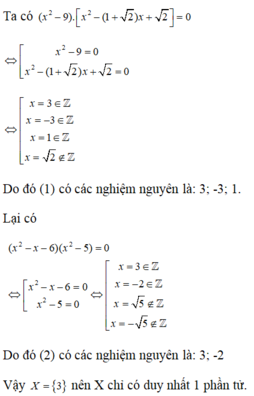2(x2 + \(1/x^2\)) - 5(x+\(1/x\)) + 6=0 (với x ≠ 0)
Hãy nhập câu hỏi của bạn vào đây, nếu là tài khoản VIP, bạn sẽ được ưu tiên trả lời.


Bài 1)1)\(x^2+5x+6=x^2+3x+2x+6\)=0
=x(x+3)+2(x+3)=(x+2)(x+3)=0
Dễ rồi
2)\(x^2-x-6=0=x^2-3x+2x-6=0\)
=x(x-3)+2(x-3)=0
=(x+2)(x-3)=0
Dễ rồi
3)Phương trình tương đương:\(\left(x^2+1\right)\left(x+2\right)^2=0\)
Vì \(x^2+1>0\)
=>\(\left(x+2\right)^2=0\)
Dễ rồi
4)Phương trình tương đương\(x^2\left(x+1\right)+\left(x+1\right)\)=0
=> \(\left(x^2+1\right)\left(x+1\right)=0Vì\) \(x^2+1>0\)
=>x+1=0
=>..................
5)\(x^2-7x+6=x^2-6x-x+6\) =0
=x(x-6)-(x-6)=0
=(x-1)(x-6)=0
=>.....
6)\(2x^2-3x-5=2x^2+2x-5x-5\)=0
=2x(x+1)-5(x+1)=0
=(2x-5)(x+1)=0
7)\(x^2-3x+4x-12\)=x(x-3)+4(x-3)=(x+4)(x-3)=0
Dễ rồi
Nghỉ đã hôm sau làm mệt

\(1,\Leftrightarrow x\left(x-9\right)=0\Leftrightarrow\left[{}\begin{matrix}x=9\\x=0\end{matrix}\right.\\ 2,\Leftrightarrow x^2-4x-x^2=7\Leftrightarrow-4x=7\Leftrightarrow x=-\dfrac{7}{4}\\ 3,\Leftrightarrow3x+2x-10=5\Leftrightarrow5x=15\Leftrightarrow x=3\\ 4,\Leftrightarrow\left(5x-1\right)\left(5x+1\right)=0\Leftrightarrow\left[{}\begin{matrix}x=\dfrac{1}{5}\\x=-\dfrac{1}{5}\end{matrix}\right.\\ 5,\Leftrightarrow\left(x-2\right)\left(3x-5\right)=0\Leftrightarrow\left[{}\begin{matrix}x=2\\x=\dfrac{5}{3}\end{matrix}\right.\\ 6,\Leftrightarrow\left(x-7\right)\left(3x+4\right)=0\Leftrightarrow\left[{}\begin{matrix}x=7\\x=-\dfrac{4}{3}\end{matrix}\right.\)
\(7,\Leftrightarrow\left(2x-3\right)\left(2x+3\right)=0\Leftrightarrow\left[{}\begin{matrix}x=\dfrac{3}{2}\\x=-\dfrac{3}{2}\end{matrix}\right.\\ 8,\Leftrightarrow\left(x-4\right)\left(10x+2\right)=0\Leftrightarrow\left[{}\begin{matrix}x=-\dfrac{1}{5}\\x=4\end{matrix}\right.\\ 9,\Leftrightarrow2x^2-5x-2x^2=0\Leftrightarrow x=0\\ 10,\Leftrightarrow2x\left(x-2\right)=0\Leftrightarrow\left[{}\begin{matrix}x=0\\x=2\end{matrix}\right.\\ 11,\Leftrightarrow\left(4x-3\right)\left(3-2x\right)=0\Leftrightarrow\left[{}\begin{matrix}x=\dfrac{3}{4}\\x=\dfrac{3}{2}\end{matrix}\right.\\ 12,\Leftrightarrow2x^2-10x-2x^2=3\Leftrightarrow-10x=3\Leftrightarrow x=-\dfrac{3}{10}\)
\(1,\Leftrightarrow x\left(x-9\right)=0\\ \Leftrightarrow\left[{}\begin{matrix}x=0\\x=9\end{matrix}\right.\\ 2,\Leftrightarrow x^2-4x-x^2=7\\ \Leftrightarrow-4x=7\\ \Leftrightarrow x=\dfrac{-7}{4}\\ 3,\Leftrightarrow3x+2x-10=5\\ \Leftrightarrow5x=15\\ \Leftrightarrow x=3\\ 4,\Leftrightarrow\left(5x-1\right)\left(5x+1\right)=0\\ \Leftrightarrow\left[{}\begin{matrix}x=\dfrac{1}{5}\\x=-\dfrac{1}{5}\end{matrix}\right.\)
\(5,\Leftrightarrow\left(x-2\right)\left(3x-5\right)=0\\ \Leftrightarrow\left[{}\begin{matrix}x=2\\x=\dfrac{5}{3}\end{matrix}\right.\\ 6,\Leftrightarrow\left(3x+4\right)\left(x-7\right)=0\\ \Leftrightarrow\left[{}\begin{matrix}x=-\dfrac{4}{3}\\x=7\end{matrix}\right.\\ 7,\Leftrightarrow\left(2x-3\right)\left(2x+3\right)=0\\ \Leftrightarrow\left[{}\begin{matrix}x=\dfrac{3}{2}\\x=-\dfrac{3}{2}\end{matrix}\right.\)
\(8,\Leftrightarrow10x\left(x-4\right)+2\left(x-4\right)=0\\ \Leftrightarrow\left(x-4\right)\left(10x+2\right)=0\\ \Leftrightarrow\left[{}\begin{matrix}x=4\\x=-\dfrac{1}{5}\end{matrix}\right.\\ 9,\Leftrightarrow2x^2-5x-2x^2=0\\ \Leftrightarrow-5x=0\\ \Leftrightarrow x=0\\ 10,\Leftrightarrow2x\left(x-2\right)=0\\ \Leftrightarrow\left[{}\begin{matrix}x=0\\x=2\end{matrix}\right.\)
\(11,\Leftrightarrow\left(2x-3\right)\left(4x-3\right)=0\\ \Leftrightarrow\left[{}\begin{matrix}x=\dfrac{3}{2}\\x=\dfrac{3}{4}\end{matrix}\right.\\ 12,\Leftrightarrow2x^2-10x-2x^2=3\\ \Leftrightarrow-10x=3\\ \Leftrightarrow x=-\dfrac{3}{10}\)

a: \(\Leftrightarrow\left(x-5\right)\left(x+1\right)\left(x-1\right)=0\)
\(\Leftrightarrow\left[{}\begin{matrix}x=5\\x=-1\\x=1\end{matrix}\right.\)
d: \(\Leftrightarrow\left(x+3\right)\left(x^2-4x+5\right)=0\)
\(\Leftrightarrow x+3=0\)
hay x=-3

Bài 1:
a) (3x - 2)(4x + 5) = 0
<=> 3x - 2 = 0 hoặc 4x + 5 = 0
<=> 3x = 2 hoặc 4x = -5
<=> x = 2/3 hoặc x = -5/4
b) (2,3x - 6,9)(0,1x + 2) = 0
<=> 2,3x - 6,9 = 0 hoặc 0,1x + 2 = 0
<=> 2,3x = 6,9 hoặc 0,1x = -2
<=> x = 3 hoặc x = -20
c) (4x + 2)(x^2 + 1) = 0
<=> 4x + 2 = 0 hoặc x^2 + 1 # 0
<=> 4x = -2
<=> x = -2/4 = -1/2
d) (2x + 7)(x - 5)(5x + 1) = 0
<=> 2x + 7 = 0 hoặc x - 5 = 0 hoặc 5x + 1 = 0
<=> 2x = -7 hoặc x = 5 hoặc 5x = -1
<=> x = -7/2 hoặc x = 5 hoặc x = -1/5

a: (2x+1)(3-x)(4-2x)=0
=>(2x+1)(x-3)(x-2)=0
hay \(x\in\left\{-\dfrac{1}{2};3;2\right\}\)
b: 2x(x-3)+5(x-3)=0
=>(x-3)(2x+5)=0
=>x=3 hoặc x=-5/2
c: =>(x-2)(x+2)+(x-2)(2x-3)=0
=>(x-2)(x+2+2x-3)=0
=>(x-2)(3x-1)=0
=>x=2 hoặc x=1/3
d: =>(x-2)(x-3)=0
=>x=2 hoặc x=3
e: =>(2x+5+x+2)(2x+5-x-2)=0
=>(3x+7)(x+3)=0
=>x=-7/3 hoặc x=-3
f: \(\Leftrightarrow2x^3+5x^2-3x=0\)
\(\Leftrightarrow x\left(2x^2+5x-3\right)=0\)
\(\Leftrightarrow x\left(x+3\right)\left(2x-1\right)=0\)
hay \(x\in\left\{0;-3;\dfrac{1}{2}\right\}\)

a) (x - 3)2 - 5.(x - 2) + 5 = 0.
<=> x^2 - 6x + 9 - 5x + 10 + 5 = 0
<=> x^2 - 11x + 24 = 0
<=> (x-3)(x-8)=0
<=> x = 3 hoặc x = 8





Giúp mình với ngày mai mình thi rồi!
Errr bạn viết lại đề bằng kí hiệu toán học được không?